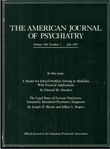Reliability of criteria for borderline personality disorder: a comparison of DSM-III and the Diagnostic Interview for Borderline Patients
Abstract
The authors compared the reliability of two methods of distinguishing borderline personality disorder--DSM-III and the Diagnostic Interview for Borderline Patients. The reference group, outpatients with other personality disorders and without major axis I pathology, was more difficult to distinguish from the patients with borderline personality disorder than such groups used in previous samples. The sensitivity and specificity of the Diagnostic Interview for Borderline Patients were calculated, with DSM-III used as a criterion. The findings confirm considerable overlap between borderline and schizotypal personality disorders, more impairment in functioning in borderline patients than in those with other personality disorders, and the high reliability with which borderline personality disorder can be diagnosed.
Access content
To read the fulltext, please use one of the options below to sign in or purchase access.- Personal login
- Institutional Login
- Sign in via OpenAthens
- Register for access
-
Please login/register if you wish to pair your device and check access availability.
Not a subscriber?
PsychiatryOnline subscription options offer access to the DSM-5 library, books, journals, CME, and patient resources. This all-in-one virtual library provides psychiatrists and mental health professionals with key resources for diagnosis, treatment, research, and professional development.
Need more help? PsychiatryOnline Customer Service may be reached by emailing [email protected] or by calling 800-368-5777 (in the U.S.) or 703-907-7322 (outside the U.S.).



